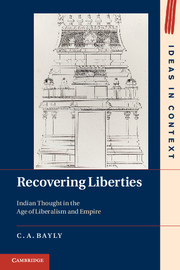Book contents
- Frontmatter
- Contents
- Preface
- Note on Indian names
- Introduction
- Chapter 1 The social and intellectual contexts of early Indian liberalism, c.1780–1840
- Chapter 2 The advent of liberalism in India
- Chapter 3 The advent of liberal thought in India and beyond
- Chapter 4 After Rammohan
- Chapter 5 Living as liberals
- Chapter 6 Thinking as liberals
- Chapter 7 Giants with feet of clay
- Chapter 8 Liberals in the Desh
- Chapter 9 ‘Communitarianism’
- Chapter 10 Inter-war
- Chapter 11 Anti-liberalism, ‘counter-liberalism’ and liberalism’s survival, 1920–1950
- Conclusion
- Glossary
- Select bibliography
- Index
- References
Chapter 9 - ‘Communitarianism’
Indian liberalism transformed, c.1890–1916
Published online by Cambridge University Press: 05 June 2012
- Frontmatter
- Contents
- Preface
- Note on Indian names
- Introduction
- Chapter 1 The social and intellectual contexts of early Indian liberalism, c.1780–1840
- Chapter 2 The advent of liberalism in India
- Chapter 3 The advent of liberal thought in India and beyond
- Chapter 4 After Rammohan
- Chapter 5 Living as liberals
- Chapter 6 Thinking as liberals
- Chapter 7 Giants with feet of clay
- Chapter 8 Liberals in the Desh
- Chapter 9 ‘Communitarianism’
- Chapter 10 Inter-war
- Chapter 11 Anti-liberalism, ‘counter-liberalism’ and liberalism’s survival, 1920–1950
- Conclusion
- Glossary
- Select bibliography
- Index
- References
Summary
The liberalism and ‘religions of mankind’ that have been discussed in previous chapters remained the dominant political sensibility in India through to 1916. The significance of the constitutional moderates in the Congress after 1906 attested to this, as did the standing of leaders such as Gokhale and Mehta. Yet, even before the First World War, liberalism was assailed from without by new integralist notions of state and society, while at the same time being transformed within, as doctrines emphasising community, the Motherland, or forms of romantic socialism, became more influential. This chapter discusses the relationship between the still powerful strain of liberal thought and these new sensibilities.
British and American intellectual historians have produced the rather awkward category of ‘liberal communitarianism’, which they associate with writers such as T. H. Green and William James. The default argument appears to be that this was a philosophy that empowered the individual to contribute to the community and that human progress was constituted in the consciousness of a good which the person holds in common with others. In other words, liberalism should be a representation of a common good, rather than a simple integer of the individual Good Life. In India, utilitarian liberalism had always been suspect, including John Stuart Mill’s late version of the ‘higher’ utilitarianism. But even in the subcontinent there was a subtle change towards an even stronger emphasis on the community in the 1890s and 1900s. Moreover, the idea of communitarianism employed in this chapter is a rather wider concept than the liberal version. It tinged all political positions, from neoconservatives, through advocates of violence in the service of the nation, to liberals and even idealist socialists, who began to laud the local caste body as a form of antique trades union.
- Type
- Chapter
- Information
- Recovering LibertiesIndian Thought in the Age of Liberalism and Empire, pp. 245 - 275Publisher: Cambridge University PressPrint publication year: 2011

